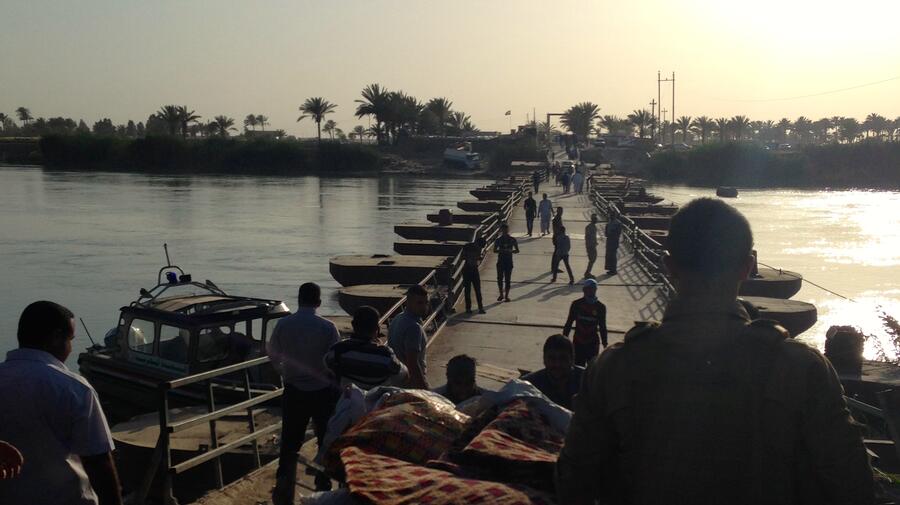UNHCR concerned at obstacles facing thousands fleeing Ramadi
UNHCR concerned at obstacles facing thousands fleeing Ramadi

Many people were stranded for several days waiting in searing heat to cross Bzebiz bridge, the main entry point from Anbar province into Baghdad. The bottleneck at the bridge has eased, but UNHCR teams report that the requirement for displaced people to have a local sponsor in Baghdad remains a concern.
GENEVA, May 29 (UNHCR) - The UN refugee agency on Friday said it was deeply concerned about the desperate situation for thousands of people fleeing fighting in the central Iraqi city of Ramadi who continue to face challenges reaching safe areas.
The International Organization for Migration estimates that some 85,000 people have fled Ramadi and surrounding areas since fresh fighting between militants and pro-government troops erupted in mid-May. The vast majority - about 85 per cent - remain in Anbar governorate. In total, more than 180,000 people are estimated to have been displaced from the Ramadi area since hostilities began in early April.
"Many people are still on the move and UNHCR, alongside others in the humanitarian community, is striving to locate them and provide life-saving assistance," UNHCR spokesman William Spindler told journalists in Geneva. "Displaced civilians still face serious obstacles at various checkpoints out of Anbar into neighbouring provinces, as local authorities impose restrictions," he said, adding that Babylon and Kerbala governorates were closed to displaced people from Anbar.
The Bzebiz bridge, the main entry point from Anbar into Baghdad, was closed for four days at the start of this latest exodus from Ramadi, leaving many people stranded in soaring temperatures as they waited to have sponsorship arrangements processed. "While the bottleneck at the bridge has now eased, our monitoring teams report that the requirement for displaced people to have a local sponsor in Baghdad remains a concern," Spindler noted.
The spokesman said this hampers swift access to safety, leaves people waiting in searing heat without proper shelter and makes the displaced vulnerable to exploitation. UNHCR is urging the authorities to address this problem and more broadly to ensure freedom of movement and swift access to safety of all displaced Iraqis citizens.
Onerous requirements for other documentation has also been a concern. UNHCR's partners have spent days helping 600 vulnerable people - many with serious medical conditions or living with disability - get access to Baghdad governorate.
Unable to move to other provinces, thousands of displaced people congregated around the city of Al-Khalidiya (east of Ramadi and also the scene of fighting in recent weeks) then moved to Al Madina Al Siyahiya and to Amriyat Al-Falujah, where UNHCR has provided aid at collective shelters. "But much more support is needed in these districts, where many still live in overcrowded conditions, without access to clean water or proper sanitation," Spindler said.
Some people are moving north towards the cities of Kalar and Kirkuk. With thousands on the move and competition for transport, journeys that would normally take a few hours are taking days. Spindler said UNHCR teams had met with displaced families from Ramadi in the Qoratu camp, in Diyala governorate, who had spent three days stranded at the Kullajo checkpoint, bordering Diyala and Sulaymaniyah.
They were only granted entry to Kalar on condition they would stay at the Qoratu camp, now hosting about 1,500 people. Authorities in Sulaymaniyah governorate have indicated that displaced people from Ramadi would be denied entry.
"Conditions are tough in the camp, which is already experiencing temperatures of 47 degrees [Celsius], still some months away from the height of summer. UNHCR is giving out fans as well as sleeping mats, jerry cans and plastic sheets to help reinforce the shade," Spindler said.
Adequate shelter is one of the key needs for thousands of displaced people, who are out in the heat for long periods. The refugee agency is focusing on providing shelter for the displaced, including in Baghdad governorate as well as Qoratu camp. "We are also working with UN and NGO partners to monitor the dispersion of people and needs at different locations, and identify possible safe locations where temporary settlements can be set up," Spindler noted.
He added that UNHCR was working with the government's Joint Coordination and Monitoring Centre to ensure that UN efforts complement those of the Iraqi government in mobilizing assistance. Since the beginning of April, UNHCR and its partners have distributed relief items to more than 33,000 people from Ramadi, as part of an inter-agency response.
The UN continues to advocate for the respect of the fundamental human rights of freedom of movement and access to safety for all Iraqis in flight. Being able to reach a place of safety makes the difference between life and death for desperate displaced people on the move.









